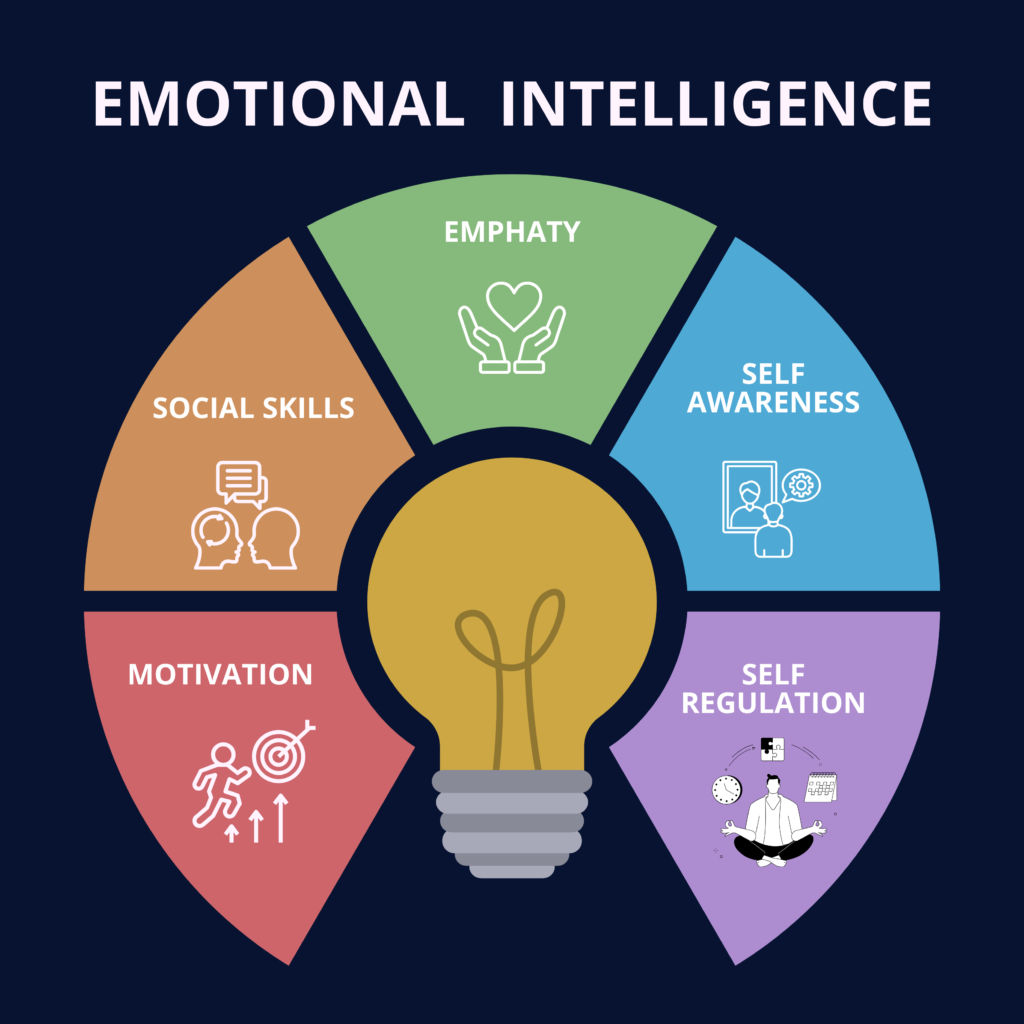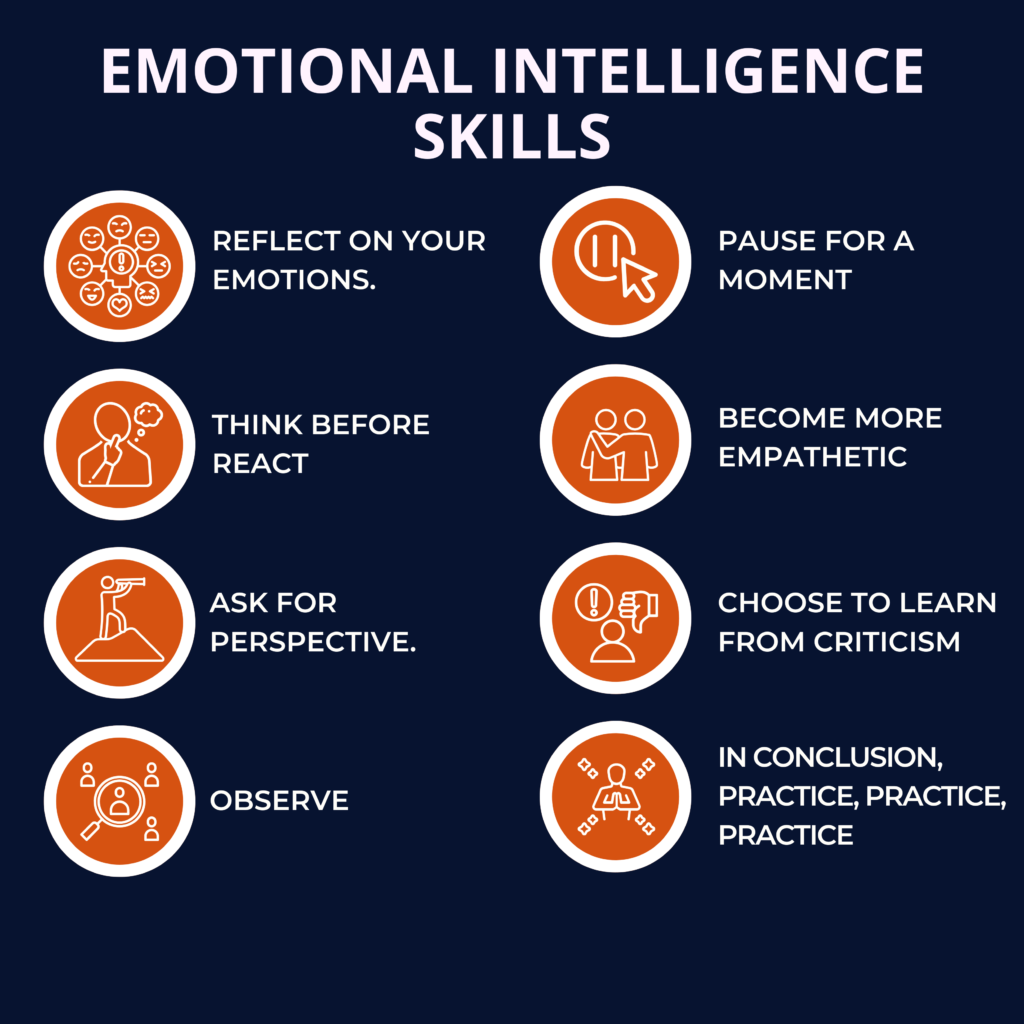“Emotional intelligence is the key to both personal and professional success.” – Daniel Goleman
Is Emotional Intelligence Important
Emotional intelligence is the ability to understand, use, and manage your feelings for the purpose of reducing stress, communicating effectively with others, empathizing with them, and overcoming challenges.
Emotional intelligence can assist you in building stronger relationships, achieving success at school and work, and achieving your career and personal goals. Also, it can help you connect with your feelings, act on your intentions, and make informed decisions regarding your personal goals

Components of Emotional Intelligence.
Self-awareness
When we’re self-aware, we know our strengths and weaknesses, as well as how we react to situations and people. This information can help us to set boundaries and manage our interactions with others in a way that is authentic to us. Additionally, when we know ourselves well, we can be more effective communicators since we are able to better understand the other person and what they might be looking for in a conversation. Finally, by being self-aware, we can work on improving ourselves and our lives in ways that are meaningful to us.
Self-management
Self-management is the process of taking charge of one’s life and making decisions that affect oneself. It is about being proactive and responsible for one’s own well-being. Self-management involves setting goals, taking action to achieve those goals, and monitoring progress along the way. It also means being flexible and adaptable, adjusting plans as needed to reach one’s goals.
Self-regulation
Because they are self-aware, emotionally intelligent people can regulate their emotions and keep them in check as necessary.
Motivation
People with high emotional intelligence tend to be highly motivated as well, which makes them more resilient and optimistic. They find ways to enjoy life even during difficult times, and they’re always looking for ways to improve themselves. This makes them more successful in all areas of their lives.
Empathy
People with empathy and compassion are simply better at connecting with other people. They have the ability to see things from other people’s perspectives, and this enables them to build relationships that are based on mutual understanding and respect. People with empathy and compassion can also easily relate to other people’s emotions, which makes them better at providing support and comfort.
Social Skills
The social skills of emotionally intelligent people show they genuinely care for and respect others and they get along well with them.
Relationship Management
Relationship management is the process of building and maintaining positive relationships with customers, clients, partners, and others who can help the organization achieve its goals. Effective relationship management can result in increased sales, improved customer loyalty, and higher levels of customer satisfaction.
Emotional Intelligence Skills
Emotional intelligence is something we can work to improve. To a large degree, our emotional intelligence starts in childhood with how we’re raised, but as adults, we can take steps to get emotionally “smarter.”

– Reflect on your emotions. This is where self-awareness begins. To grow in emotional intelligence, think about your own emotions and how you typically react to negative situations, whether they involve a co-worker, family member or stranger. When you’re more aware of your emotions and typical reactions, you can start to control them
– Think before react. It is essential to think before you react in certain situations. Instant reactions may be sometimes rigorous and the words used may create a long-lasting impact on others’ emotions. Hence, it is very important to think before reacting in any situation, and communicating softly and understandably will help to solve issues more easily and wisely
– Ask for perspective. What we perceive to be reality is often quite different from what those around us are seeing. Start getting input from others to understand how you come across in emotionally charged situations
– Observe. Once you’ve increased your self-awareness and you understand how you’re coming across, pay more attention to your emotions
– Pause for a moment. Stop and think before you act or speak. It’s hard to do, but keep working at it and it will become a habit
– Become more empathetic by understanding the “why.” Try to understand the “why” behind another person’s feelings or emotions
– Choose to learn from criticism. Who likes criticism? Possibly no one. But it’s inevitable. When we choose to learn from criticism rather than simply defend our behaviors, we can grow in emotional intelligence
In conclusion, Practice, practice, practice. Becoming more emotionally intelligent won’t happen overnight, but it can happen—with effort, patience, and a lot of practice.





Leave a Reply